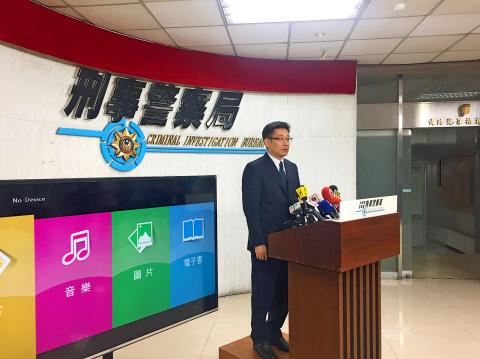Premier William Lai (賴清德) yesterday requested that government agencies review the nation’s information security after Far Eastern International Bank (遠東商銀) reported that its system was hacked earlier in the week.
The premier was fully briefed on the incident and instructed the government to learn from the case and tighten information security by closing vulnerabilities, Cabinet spokesman Hsu Kuo-yung (徐國勇) said.
Far Eastern on Friday said it reported to the Financial Supervisory Commission that malware had been implanted in its computer system, which affected some of its PCs and servers, as well as the Society for Worldwide Interbank Financial Telecommunication (SWIFT) network.

Photo: Chiu Chun-fu, Taipei Times
SWIFT is a members-only organization that provides safe and secure financial transactions for its members via a standardized proprietary communications platform, which can facilitate the transmission of information about financial transactions.
Through the malware, hackers conducted virtual transactions to move funds totaling nearly US$60 million from Far Eastern clients’ accounts to foreign destinations such as Sri Lanka, Cambodia and the US, the bank found on Tuesday.
However, the bank said that due to its efforts to trace back the lost funds, the cyberattack cost the bank less than US$500,000.
As efforts to trace the lost funds by underpinning certain fund movements continue, the loss could be reduced to zero, it added.
The hacking did not lead to any leaks of client information, Far Eastern said.
Far Eastern vice president Liu Lung-kuang (劉龍光) yesterday told reporters that the origin of the malware has not been confirmed, but added that the bank is sure that the malicious software used to attack the transaction system is a new variety that had never been seen before.
The Criminal Investigation Bureau yesterday said that it has launched an investigation into the cyberattack and requested that the bank submit details about its computer operations after it reported the case to the bureau on Thursday.
The bureau said it has also informed the International Criminal Police Organization, commonly known as Interpol, of the case and asked for assistance.
Due to the international assistance, the bureau said Far Eastern’s losses are expected to be less than US$500,000, adding that similar hacking cases were reported in Vietnam and Bangladesh in 2015 and last year.
It was the first case in which malware was implanted into a Taiwanese bank’s computer network to transfer massive amounts of funds out of clients’ accounts.
The commission said that it was an isolated case, adding that no other incidents have been reported in the nation.
Far Eastern will have to shoulder all of the responsibility for the incident and bear all possible losses so that its clients’ interests will not be affected, the commission said.
The commission said it has asked Far Eastern to submit a comprehensive report on the incident to determine whether the bank should face regulatory punishment.
The commission has asked all banks in the nation to tighten controls on transactions during the ongoing four-day Double Ten National Day holiday.

Tropical Storm Gaemi strengthened into a typhoon at 2pm yesterday, and could make landfall in Yilan County tomorrow, the Central Weather Administration (CWA) said yesterday. The agency was scheduled to issue a sea warning at 11:30pm yesterday, and could issue a land warning later today. Gaemi was moving north-northwest at 4kph, carrying maximum sustained winds near its center of up to 118.8kph and gusts of 154.8kph. The circumference is forecast to reach eastern Taiwan tomorrow morning, with the center making landfall in Yilan County later that night before departing from the north coast, CWA weather forecaster Kuan Shin-ping (官欣平) said yesterday. Uncertainty remains and

SEA WARNING LIKELY: The storm, named Gaemi, could become a moderate typhoon on Wednesday or Thursday, with the Taipei City Government preparing for flooding A tropical depression east of the Philippines developed into a tropical storm named Gaemi at 2pm yesterday, and was moving toward eastern Taiwan, the Central Weather Administration (CWA) said. Gaemi could begin to affect Taiwan proper on Tuesday, lasting until Friday, and could develop into a moderate typhoon on Wednesday or Thursday, it said. A sea warning for Gaemi could be issued as early as Tuesday morning, it added. Gaemi, the third tropical storm in the Pacific Ocean this typhoon season, is projected to begin moving northwest today, and be closest to Taiwan on Wednesday or Thursday, the agency said. Today, there would likely

DISRUPTIONS: The high-speed rail is to operate as normal, while several airlines either canceled flights or announced early departures or late arrivals Schools and offices in 15 cities and counties are to be closed today due to Typhoon Gaemi, local governments announced last night. The 15 are: Taipei, New Taipei City, Taoyuan, Tainan, Keelung, Hsinchu and Kaohsiung, as well as Yilan, Hualien, Hsinchu, Miaoli, Chiayi, Pingtung, Penghu and Lienchiang counties. People should brace for torrential rainfall brought by the storm, with its center forecast to make landfall on the east coast between tonight and tomorrow morning, the Central Weather Administration (CWA) said. The agency issued a sea warning for the typhoon at 11:30pm on Monday, followed by a land warning at 11:30am yesterday. As of

CASUALTY: A 70-year-old woman was killed by a falling tree in Kaohsiung as the premier warned all government agencies to remain on high alert for the next 24 hours Schools and offices nationwide are to be closed for a second day today as Typhoon Gaemi crosses over the nation, bringing torrential rain and whipping winds. Gaemi was forecast to make landfall late last night. From Tuesday night, its outer band brought substantial rainfall and strong winds to the nation. As of 6:15pm last night, the typhoon’s center was 20km southeast of Hualien County, Central Weather Administration (CWA) data showed. It was moving at 19kph and had a radius of 250km. As of 3pm yesterday, one woman had died, while 58 people were injured, the Central Emergency Operation Center said. The 70-year-old